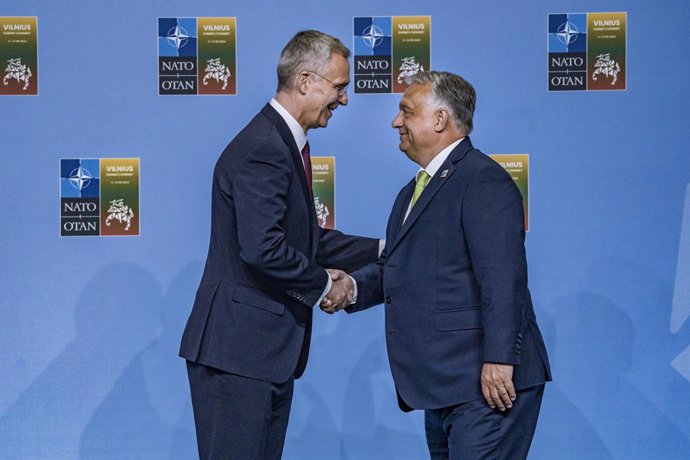Hungary successfully negotiated guarantees from both NATO and the EU that it wouldn’t be drawn into their activities regarding Ukraine’s conflict with Russia. Orban secured a firm commitment that neither organization would exert pressure on Hungary to engage in a direct confrontation with Russia.
Orban’s opposition to NATO and EU policies toward Russia reflects Hungary’s over-dependency with Russia, particularly in the energy sector. Hungary’s heavy dependence on Russia for a significant portion of its oil, natural gas, and nuclear fuel imports underscores the precarious nature of its economic relationship. Any further trouble between the relations can severely impact Hungary’s economy, highlighting the delicate balance Orban must maintain in his diplomatic maneuvering.
He seems to calculate that neither NATO nor the EU can effectively counter Russia, so why risk upsetting Putin and potentially jeopardizing Hungary’s economic stability?
The decision-making process within NATO and the EU typically centers on reaching a consensus among its more prominent and influential members. This often results in exercising a coercive approach towards smaller nations that may hold differing priorities or strategic concerns. At times, NATO’s assertive nature in aligning smaller members with broader alliance objectives, even if not perfectly aligned with their national interests or public sentiment, has been noticeable.
The dominance of larger member states in shaping strategic directions frequently diminishes the ability of smaller nations to independently influence outcomes. This highlights NATO’s delicate balance between collective security commitments and respecting the sovereignty and varied perspectives of all its members.
Hungarian Prime Minister Viktor Orban recently held discussions with NATO chief Jens Stoltenberg regarding NATO’s military support for Ukraine. Hungary agreed not to oppose NATO’s decisions on military aid to Ukraine, a stance similar to its previous approach towards EU decisions, in exchange for specific assurances.
These assurances encompass Hungary not being compelled to participate in conventional interventions in Ukraine, nor permitting its territory to be used for such purposes, and avoiding financial support for the Ukrainian Armed Forces. Orban’s attempts to oppose NATO’s plans for Ukraine garnered praise from some dissidents in the West who oppose the proxy conflict with Russia.
Despite cautioning against the risks associated with the proxy war, Orban’s influence as the leader of a smaller nation limited his ability to significantly alter NATO’s course of action. Orban’s primary achievement lay in securing public guarantees that Hungary would not be drawn into military adventures in Ukraine, without changing NATO and EU plans for Ukraine.
NATO opted to agree to Hungary’s decision to avoid negative perceptions of coercion or bullying. Pressuring Hungary to participate could have led to visible internal unrest and logistical complications, potentially complicating NATO’s image and operations.
Orban’s prior disagreements with both the EU and NATO revolved around safeguarding Hungary’s national interests, particularly its financial resources and military engagements. Orban succeeded in obtaining assurances from both the EU and NATO concerning financial aid and military activities linked to Ukraine. The agreements with these bodies included superficial concessions to maintain the appearance of democratic processes within their frameworks.
Orban’s decisions were influenced by pragmatic considerations, his concessions to the EU and NATO did not result in Hungary losing substantial control or resources; instead, he maintained symbolic protests while achieving his objectives. Orban’s leadership strategy focused on securing Hungary’s national interests without jeopardizing its relationships with international bodies such as NATO and the EU, as Hungary is still dependent on these two for a lot of things. His stance on Ukraine aligned with his broader diplomatic approach of balancing Hungary’s interests with international expectations.
Orban’s diplomatic successes with the EU and NATO underscore his adeptness in navigating Hungary’s position within broader geopolitical frameworks. Hungary’s diplomatic negotiations with NATO underscore the complexities of balancing national interests within an alliance.
Overall, Orban’s handling of Hungary’s relations with NATO and the EU concerning Ukraine reflects a calculated strategy to safeguard Hungary’s interests on the global stage. Orban’s opposition to NATO and EU policies towards Russia arises from Hungary’s pursuit of closer economic ties with Russia, particularly in energy, and his realization that NATO and the EU cannot collectively overpower Russia, thus avoiding unnecessary expenditures of Hungarian resources is better, it not only protect Hungary from being drawn into a potentially unwinnable conflict but also safeguards its critical energy supplies and economic well-being.








